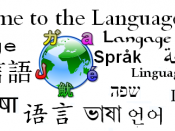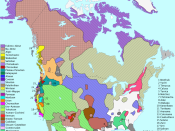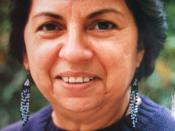Dialects, Opposed to Languages
In the essay titled "How to Tame a Wild Tongue," Gloria Anzaldua is saying that her language has a lot to do with identity. She speaks many different forms of Spanish, as well as English, and thinks that she is judged by the way she speaks. I thought that many of the ways she spoke were more of different dialects than different languages. I know I speak a different dialect of English a lot, like "that ain't cool", or "yo what's up", but I would not consider this to be a different language (although Anzaldua might).
Anzaldua is relating these different "languages" to her identity, and I think it is important to distinguish the similarities and differences in them. She states "And because we are a complex, heterogenous people, we speak many languages. Some of the languages we speak are: standard English, working class and slang English, standard Spanish, standard Mexican Spanish, North Mexican Spanish dialect, Chicano Spanish, Tex-Mex, and Pachuco" (166).
I think by heterogenous people she means they have many different attributes and it's harder for other cultures to understand them (meaning their bacgkrounds and identity, rather than laguage). Even though she does distinguish some of these to be slang or another dialect, I think they could be considered another form of Spanish (besides Standard English).
If I were to look up the word language, it might say "communication by word or mouth". To me, this isn't a very convincing definition, because if I were to open my mouth and babble about nothing, it would be considered speaking a language. I believe language is when you speak your own language (with the exception of bilingual people) and that is how you speak regularly to communicate on a basic level. Then there are many...


